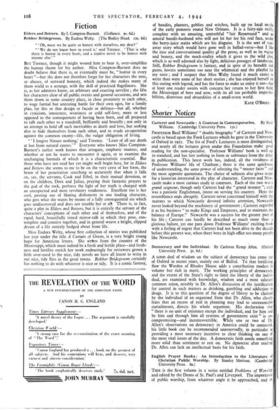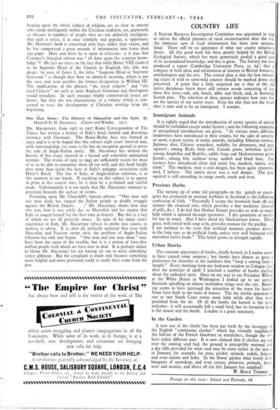Shorter Notices
Carteret and Newcastle : A Contrast ha Contemporaries. By Basil Williams. (Cambridge University Press. 15s.) PROFESSOR Basil Williams' " double biography" of Carteret and Newcastle is based upon the Ford, Lectures which he gave in the University of Oxford in 1922. The list of Ford's Lecturers is most distinguished, and neatly all the lectures given under this Foundation make good reading for the non-specialist. Professor Williams' book is well up to standard, and has lost nothing in form or substance from the delay in publication. This latest work has, indeed, all the vividness of Professor Williams' life of Chatham ; there is the same quickness of understanding, the same power of selecting the "master facts" and the most apposite quotations. The choice of subjects also gives scope for a historian interested in the play of character. Carteret and Newcastle make a most curious study in contrasts. Each of the two was a grand seigneur, though only Carteret had the "grand manner "; each was a patriotic Englishman, intent on serving his country. Here the resemblance ends abruptly. Carteret never concerned himself with the matters to which Newcastle devoted infinite attention, Newcastle never looked beyond the machinery of government ; Carteret regarded it as his business "to make Kings and Emperors, and to maintain the balance of Europe." Newcastle was a success for the greater part of his life ; Carteret can hardly be described as much more than a glorious failure yet one puts down Professor Williams' exciting book with a feeling Of regret that Carteret had not been alive in the decade before this present war, when there Were in high office too many people like Newcastle.
Democracy and the Individual. By Carleton Kemp Allen. (Oxford University Press. 38. 6d.) A Goan deal of wisdom on the subject of democracy has come out of Oxford in recent years mainly out of Balliol. To that fertilising flow the Warden of Rhodes House adds a contribution modest in volume but rich in merit. The working principles of democracy, and the extent of the State's right to limit the liberty of the individual, are examined with knowledge, wisdom and a most salutary common sense, notably in Dr. Allen's discussion of the justification for control in such matters as drinking, gambling and addiction to drugs. It is to this question of the degree of liberty to be claimed by the individual iii an organised State that Dr. Allen, who clearly fears that an excess of zeal in planning may lead to unreasonable curtailments, directs his whole argument. His declaration that "there is no unit of existence except the individual, and for him and by him and diroUgh him all systems of government exist" is uncompromising—and incontrovertible. While one or two of Dr. Allen's observations on democracy in America could be contested, his little book can be recommended unreservedly, in particular as providing a most necessary incentive to clear thinking on one of the most vital issues of the day. A democratic faith needs something more solid than sentiment to rest on. No democrat after reading Dr. Allen can lack an intellectual basis for his faith..
English Prayer Books : An Introduction to the Literature of Christian Public Worship. By Stanley Morison. (Cambridge University Press. 6s.)
THIS is the first volume in a series entitled Problems of WorshiP and edited by the Deans of St. Paul's and Liverpool. The importanct of public worship, from whatever angle it be approached, and its bearing upon the whole subject of religion, are so clear to anyone who stands intelligently within the Christian tradition, yet, apparently so obscure to numbers of people who are not definitely irreligious, that such a series, if at once scholarly and popular, is opportune. Mr. Morison's book is concerned with facts rather than values, and he has compressed a great amount of information into fewer than 150 pages Here and there he is open to criticism: is it true that Cranmer's liturgical reform was "all done upon the scantiest knowledge "? He lays no stress on the fact that while Henry VIII claimed to be Supreme Head of the Church in England, this title was dropt : he uses, of James I, the titles "Supreme Head or Supreme Governor" as though they bore an identical meaning, which is not the case, and even ascribes the former designation to William III. The implications of the phrases "the royal religion" and "the royal Church" are such as most Anglican historians and theologians would repudiate. In such passages highly controversial issues are latent ; but they are not characteristic of a volume which is concerned to trace the development of Christian worship from the
beginning.
One Man Alone: The History of Mussolini and the Axis. By Maxwell H. H. Macartney. (Chatto and Windus. 15s.) MR. MACARTNEY, from 1927 to 1937 Rome Correspondent of The Times, has written a history of Italy's brief, hateful and disastrous intimacy with Germany. The Rome-Berlin Axis was formed in
• 1935, and it is to be hoped that this solitary eight years' interval may, with statesmanship, yet come to be but an exception quoted to prove the rule of Anglo-Italian amity. Mr. Macartney has written the history of this tragic interval in a factual and somewhat uninspired manner. The events of 1935 to 1943 are sufficiently recent for most of us to be able to remember them all too well, and this book hardly does more than recite the facts of Italy's unhappy association with Hitler's Reich. The fate of Italy, of Anglo-Italian relations, is at this moment in our hands. If anything on this subject is to appear in print at this crucial time, let it then be a profound and careful study. Unfortunately it is too rarely that Mr. Macartney ventures to penetrate beneath the surface of events.
Fastening upon Mr. Churchill's famous phrase: "One man and one man alone has ranged the Italian people in deadly struggle against the British Empire. . . ," Mr. Macartney shows how true this was, how it was solely due to Mussolini and his regime that Italy so ranged herself for the first time in history. But this is a fact of which we are all perfectly aware. In spite of his many years' experience in Italy, Mr. Macartney refuses to probe into causes, to analyse, to advise. It is, after all, peifectly apparent that even with Mussolini and Fascism swept away the problem of Anglo-Italian relations has only just begun. "One man and one man alone" may have been the cause of the trouble, but it is a nation of forty-five million people with which we have now to deal. It is perhaps unjust to blame Mr. Macartney for not having set out to write something rather different. But the complaint is made only because something more helpful and more profound could so easily have come from his pen.























 Previous page
Previous page